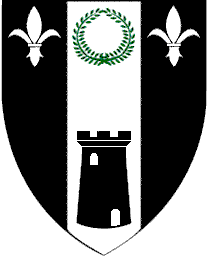Poem of the Pell
Practice at the pell (a man-sized stake of wood used as a target for
swordpractice) has long been used by SCA fighters for practice, as it will
soon be used here in Insula Draconis (just as soon as we get all of
thatwood in my garden chopped up and assembled!). This form of training goes
back as far the days of the Roman legions, and was used throughout the
middle ages. Young knights or men-at-arms were first trained at this pell,
under the supervision of an older, more experienced fighter.
This poem, written in the early fifteenth century, sheds some light on the
use of the pell. Interesting points to note are the mention in lines 6-9 that
the practice shield and mace are to be of double weight, a technique that
many SCA fighters have found to be very good for training. It also emphasizes
the importance of this form of practice in 12-14, where it says that no man
"is seyn prevaile" in battle who has not spent time practicing at the pell.
Take heed squires and novice fighters, to the wisdom of the past!
Poem of the Pell Cotton Library: Titus A, xxiii fol 6 and 7
(early 15th century)
Of fight the disciplyne and exercise,
Was this. To have a pale or pile upright (pell)
Of mannys light, thus writeth old and wise, (man's height)
Therewith a bacheler, or a yong knyght,
Shal first be taught to stonde and lerne to fight
And fanne of double wight tak him his shelde, (practice shield)
Of double wight a mace of tre to welde. (wood)
This fanne and mace whiche either doubil wigt
Of shelde, and swayed in conflicte, or bataile,
Shal exercise as well swordmen, as knyghtes,
And noe man, as they sayn, is seyn prevaile,
In field, or in castell, though he assayle,
That with the pile, nethe first grete exercise, (hath not)
Thus writeth werrouris olde and wyse. (warriors)
Have eche his pile or pale upfixed fast
And as it were uppon his mortal foe:
With mightyness and weapon most be cast
To fight stonge, that he ne skape him fro.
On hym with shield, and sword avised so,
That thou be cloos, and Preste thy foe to smyte, (ready)
Lest of thyne own dethe thou be to wite.
Empeche his head, his face, have at his gorge (attack, throat)
Beare at the brest, or sperne him on the side,
With myghte knyghtly poost ene as Seynt George (power)
Lepe o thy foe; look if he dare abide;
Will he not flee? wounde him; make wounds wide
Hew of his honde, his legge, his theys, his armys,
It is the Turk, though he be sleyn, noon harm is.






 Articles
Articles





 Articles
Articles




